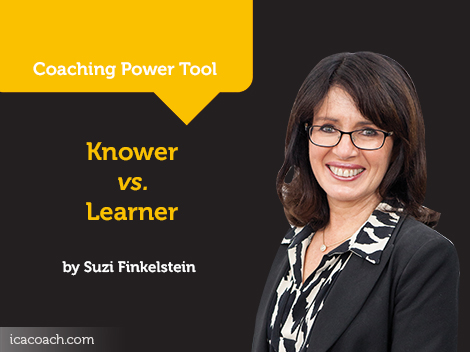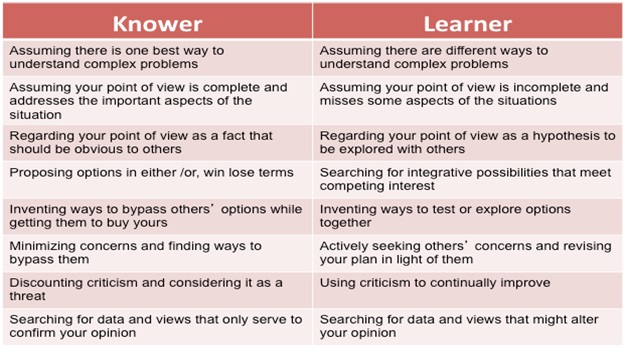
A Coaching Power Tool Created by Suzi Finkelstein
(Executive Coach, AUSTRALIA)
The response to the question `are you interested in learning more?’ will depend on the availability to question and search for additional meaning. This is often called a learning or growth mindset.
To focus on mindset, we need to look at the conscious and unconscious values, beliefs and attitudes. Our mindset operates as a filter, conditioning how we see and interpret reality.
There are two ways to approach learning, one is that of the `learner’, in the belief of lifelong learning or as a `knower’, believing that all the learning is complete.
As a `knower’ we would see our opinion as fact, the way we see the world we believe is reality not just our own perspective. A knower could judge their self worth by their knowledge and the ability to save face with the awareness that they are absolutely correct. Questions would threaten us, as would any form of investigation or exploration. We would see ourselves as the thought – ` I am my thought’.
As a `learner’ we would see the attainment of knowledge as a growth opportunity, valuing the process along with the way. Our self worth would be linked to learning and exploration, our identity would be aligned with the notion that `I am the thinker of my thoughts’ and we would be open to disagreements and challenges.
The Curse of Knowledge:
When we are given knowledge, it is impossible to imagine what it’s like to LACK that knowledge. Chip Hea
Self Application
By answering these questions you are creating awareness of your state of mind around the mindset that you bring.
Consider the ramifications of having a fixed mindset as a `knower’ or as a `learner’.
As a `knower’ others would sense arrogance and a resolve that is impermeable. They would also experience you as either an expert or as someone ignorant without the ability to recognize this. A `knower’ would sit in judgment and appear superior within this, creating a barrier to connection and relatedness.
As a `learner’ others would sense your zest for life and learning. They would also experience your willingness to grow and test and retest assumptions. Being curious is a sign of a `learner’ mindset. Even though all of this is positive, if this `learner’ mindset is fixed, there could also be a negative impact. You would always be seen as an interrogator, in search of answers. Your opinions could be over-looked, as you would be seen as having only the ability to inquire.
Ultimately, we could blend the two mindsets and with conscious awareness, we could decide which mindset to bring.
Coaching Application
For a coach to be totally present and available to `follow’ the client it is imperative that the coach approaches all sessions using a `learner’ mindset. The coach uses curiosity to enquire about the client’s state and needs and ensures that any response isn’t leading or directing. The premise of coaching is that the client is the expert in their world; so the coach is by no way seen as the subject matter expert and required to give advise like a consultant or a therapist would.
This power tool, learner vs knower is also a powerful tool to use within the coaching session enabling the client to build awareness around the blockers and fixed perspectives that are no longer of service.
To enable the client to question and explore thinking, responses and decisions allows the client to create some distance from the emotion. It enables that balcony view of what is going on the dance floor of their world. It creates a sense of curiosity and even detachment. A rich place for discovery, perception shift and awareness.
Reflection:
- Which space is most comfortable for you, knower or learner?
- When is it helpful for you to be in either space?
- What are the questions that could benefit the space that you are in?
- When you are in the presence of a knower or a learner, how do you react? Is it helpful?
It’s not a question of learning much.
On the contrary.
It’s a question of unlearning.
Osho
